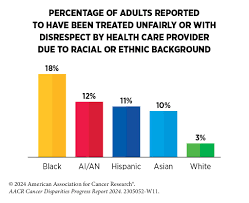Health Insurance Disparities Contribute to Advanced Cancer Diagnoses Among Racial and Ethnic Groups

A significant new study led by researchers at the American Cancer Society (ACS) highlights the critical role of health insurance coverage in explaining racial and ethnic disparities in the advanced-stage diagnosis of multiple cancers. Published today in the Journal of the National Cancer Institute (JNCI), the findings underscore the importance of access to high-quality healthcare throughout the cancer continuum—from prevention and early detection to treatment and survivorship in the United States.
"Health insurance coverage is a key determinant of access to high-quality healthcare across the cancer continuum," said Dr. Parichoy Pal Choudhury, Principal Scientist in Biostatistics at ACS and lead author of the study. "These findings could inform appropriate policies aimed at increasing health insurance coverage for all populations."
The study analyzed data from 1.9 million cancer patients aged 18 to 64 diagnosed with one of 10 major cancers between 2013 and 2019. These cancers, which can be detected early through screening, physical examination, or clinical symptoms, include breast (female), prostate, colorectum, lung, cervix, head and neck, stomach, urinary bladder, uterus, and skin melanoma.
The researchers found evidence of mediation of disparities in advanced cancer diagnoses: non-Hispanic Black versus White disparities in eight cancers (4.5% to 29.1% mediated); Hispanic versus non-Hispanic White disparities in six cancers (13.2% to 68.8% mediated); and non-Hispanic Asian/Pacific Islander versus White disparities in three cancers (5.8% to 11.3% mediated). Health insurance significantly accounted for the racial and ethnic disparities in stage III-IV diagnoses across a wide range of cancers.
Dr. Pal Choudhury emphasized the importance of securing health insurance for everyone, stating, "This would improve access to healthcare and could reduce racial and ethnic disparities in the stage of cancer at the time of diagnosis, which in turn would impact cancer survival rates."
The American Cancer Society Cancer Action Network (ACS CAN) is actively advocating for lawmakers and the courts to protect and strengthen provisions of the Affordable Care Act (ACA). This includes urging Congress to make permanent the ACA Marketplace enhanced tax credits, which have notably increased health insurance coverage among historically marginalized communities, and advocating for the maintenance of access to no-cost preventive care in the Supreme Court case of Braidwood vs. Becerra.
"This study reinforces the extensive evidence highlighting the importance of health insurance coverage and emphasizes the need for elected officials to prioritize access to care for everyone," said Lisa A. Lacasse, president of ACS CAN. "The ACA has implemented many provisions that have significantly improved the healthcare system, reducing barriers to care for cancer patients, survivors, and their families. We urge lawmakers and the courts to preserve and strengthen these critical patient protections to ensure equitable opportunities for preventing, detecting, treating, and surviving cancer."
Other researchers from ACS contributing to this study include Dr. Leticia Nogueira, Dr. Ahmedin Jemal, and senior author Dr. Farhad Islami.
Story Source:
Materials provided by American Cancer Society. The original text of this story is licensed under a Creative Commons License. Note: Content may be edited for style and length.
Journal Reference:
- Parichoy Pal Choudhury, Helmneh M Sineshaw, Rachel A Freedman, Michael T Halpern, Leticia Nogueira, Ahmedin Jemal, Farhad Islami. Contribution of health insurance to racial and ethnic disparities in advanced stage diagnosis of 10 cancers. JNCI: Journal of the National Cancer Institute, 2024; DOI: 10.1093/jnci/djae242

0 Comments